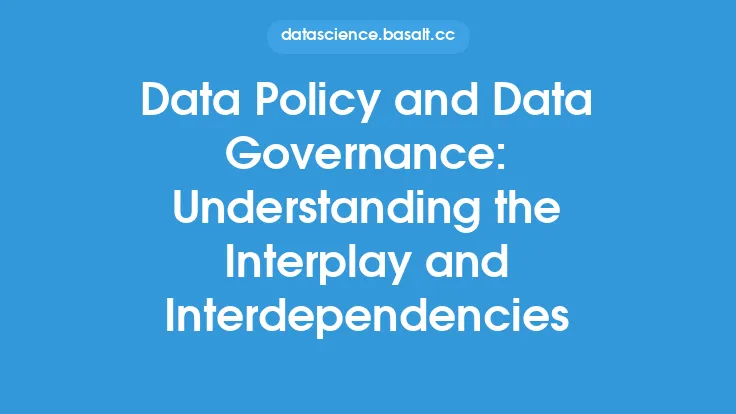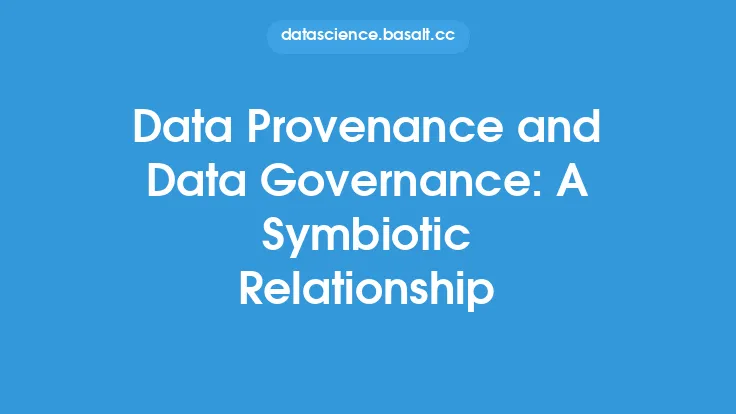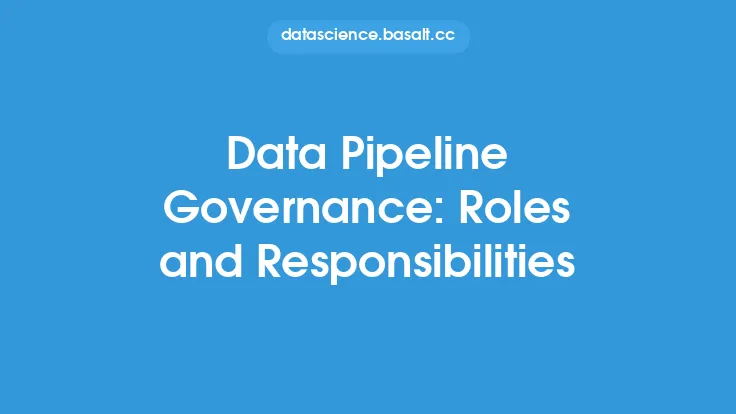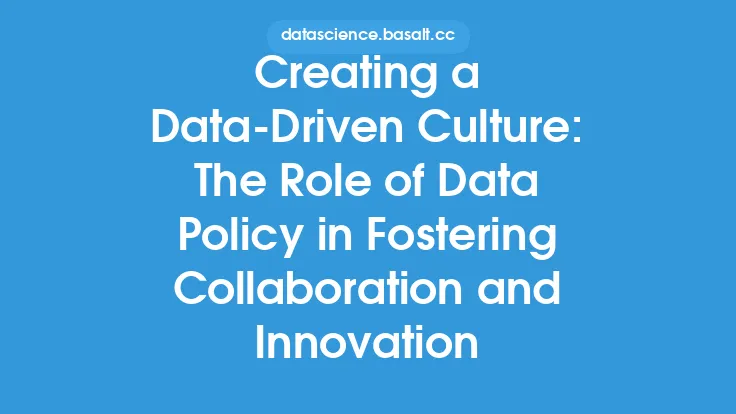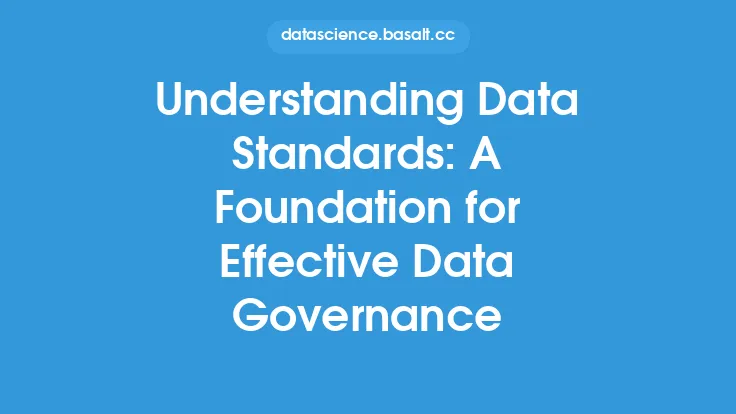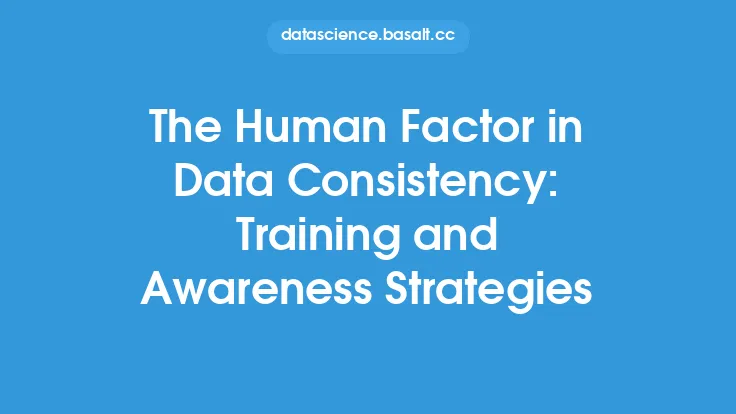In the realm of data, two terms are often used interchangeably, yet they have distinct meanings: data governance and data management. While they are related and complementary, understanding the difference between them is crucial for organizations seeking to leverage their data assets effectively. Data governance refers to the overall management of the availability, usability, integrity, and security of an organization's data. It encompasses the policies, procedures, and standards that ensure data is properly managed and utilized across the organization. Data governance is concerned with defining the roles, responsibilities, and processes for managing data, as well as ensuring compliance with regulatory requirements and industry standards.
Introduction to Data Management
Data management, on the other hand, refers to the process of planning, organizing, and controlling the data resources of an organization. It involves the acquisition, storage, retrieval, and dissemination of data, as well as the management of data quality, security, and integrity. Data management is a critical component of data governance, as it provides the framework for implementing data governance policies and procedures. Effective data management enables organizations to ensure that their data is accurate, complete, and consistent, and that it is available to authorized users in a timely and efficient manner.
Key Components of Data Governance
Data governance typically involves several key components, including data quality, data security, data privacy, and data compliance. Data quality refers to the accuracy, completeness, and consistency of an organization's data, while data security refers to the measures taken to protect data from unauthorized access, use, or disclosure. Data privacy refers to the protection of sensitive information, such as personal data, from unauthorized access or use. Data compliance refers to the adherence to regulatory requirements and industry standards, such as GDPR, HIPAA, and PCI-DSS. Data governance also involves the establishment of data governance policies, procedures, and standards, as well as the definition of roles and responsibilities for data management.
Data Management Processes
Data management involves several key processes, including data acquisition, data storage, data retrieval, and data dissemination. Data acquisition refers to the process of collecting and capturing data from various sources, while data storage refers to the process of storing and managing data in a database or other repository. Data retrieval refers to the process of accessing and retrieving data from a database or other repository, while data dissemination refers to the process of distributing data to authorized users. Data management also involves the management of data quality, security, and integrity, as well as the monitoring and reporting of data-related metrics and performance indicators.
Relationship Between Data Governance and Data Management
Data governance and data management are closely related, and they are often used together to achieve a common goal. Data governance provides the framework for managing data, while data management provides the processes and procedures for implementing data governance policies and procedures. Effective data governance enables organizations to ensure that their data is properly managed and utilized, while effective data management enables organizations to implement data governance policies and procedures. The relationship between data governance and data management is one of mutual support and dependency, and organizations that seek to leverage their data assets effectively must understand and address both aspects.
Best Practices for Implementing Data Governance and Data Management
Implementing effective data governance and data management requires a structured approach that involves several key steps. First, organizations must define their data governance policies and procedures, including data quality, security, and compliance standards. Next, organizations must establish clear roles and responsibilities for data management, including data ownership, stewardship, and custodianship. Organizations must also implement data management processes, including data acquisition, storage, retrieval, and dissemination, as well as data quality, security, and integrity management. Finally, organizations must monitor and report on data-related metrics and performance indicators, and continuously review and refine their data governance and data management practices.
Technical Considerations
From a technical perspective, data governance and data management involve several key considerations, including data architecture, data modeling, and data warehousing. Data architecture refers to the design and structure of an organization's data assets, including databases, data warehouses, and data lakes. Data modeling refers to the process of creating a conceptual representation of an organization's data, including entities, attributes, and relationships. Data warehousing refers to the process of storing and managing data in a centralized repository, including data marts, data warehouses, and data lakes. Organizations must also consider data security and privacy, including encryption, access controls, and anonymization, as well as data quality and integrity, including data validation, data cleansing, and data normalization.
Conclusion
In conclusion, data governance and data management are two distinct yet complementary aspects of managing an organization's data assets. Data governance provides the framework for managing data, while data management provides the processes and procedures for implementing data governance policies and procedures. Understanding the difference between data governance and data management is crucial for organizations seeking to leverage their data assets effectively, and implementing effective data governance and data management practices requires a structured approach that involves several key steps. By defining data governance policies and procedures, establishing clear roles and responsibilities, implementing data management processes, and monitoring and reporting on data-related metrics and performance indicators, organizations can ensure that their data is properly managed and utilized, and that they are able to unlock the full potential of their data assets.
